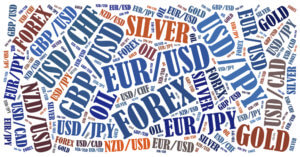The U.S. dollar surged forward on Thursday, heading towards a two-year high against a basket of major currencies. The Federal Reserve’s meeting minutes showed the agency is preparing to move aggressively to fight inflation. Unlike the dollar, commodity-linked currencies declined. The euro also traded near a one-month low below $1.09 as market players await European Central Bank minutes due later.
On Wednesday, minutes from the March Fed meeting showed many participants were prepared to increase interest rates in 50-basis-point increments in the coming months. They also prepared markets for a reduction in the agency’s balance sheet after the May meeting at a rate of $95 billion per month. That would mark the beginning of the reversal of the massive stimulus the Fed pumped into the economy after the coronavirus pandemic struck.
ING analysts noted that the process is going almost twice as quickly as markets saw during the last balance sheet run-down during the 2017-19 cycle. They also added that all of the above points to the Federal Reserve applying a heavy foot to the brakes, which should be positive for the greenback.
On Thursday, the U.S. dollar index exchanged hands at 99.676 after earlier hitting 99.823, its strongest since May 2020. Meanwhile, the Australian and New Zealand dollars plummeted by 0.5% and 0.2%, respectively. Fed officials’ tone offset a hawkish shift from Australia’s central bank. In addition, a pullback in commodity prices reversed some of the currencies’ recent strength.
How is the Euro faring?
Minutes from the ECB’s March meeting are due later in the day. Investors hope for insight into policymakers’ delicate balancing act to manage surging inflation and slowing growth. A close-looking presidential election in France became another wildcard. The prospect of far-right candidate Marine Le Pen beating Emmanuel Macron has weighed on the common currency and French debt ahead of the first-round vote due on Sunday.
On Thursday, the euro hit a one-month low of $1.0865. It lost 0.1% at $1.0887 at last. The Japanese yen also traded near a one-week low, at last dropping to 123.80 against the dollar. Citi foreign exchange strategists noted that inflation differentials and the resulting monetary policy divergence dynamics would likely underpin DXY [U.S. dollar] resilience near term. It seems high inflation is here to stay. The hawks are in the driving seat for now. This matters for DXY given the strength of relative rates in driving the EUR/USD pair and the USD/JPY pair recently. However, the British pound recovered a small part of recent losses, gaining 0.1% at $1.3075.
What about the EM currencies?
Emerging market assets plunged on Thursday partly due to the Fed’s aggressive call for further tightening in monetary policy. A lockdown in China’s commercial hub Shanghai also constrained risk-taking sentiment. As a result, Asian emerging markets traded in the red on Thursday. Shanghai is still under a city-wide lockdown. It reported over 19,000 new Covid-19 cases on April 6. China’s stock gauges shaved off more than 1% just a day after bleak economic data.
Furthermore, most emerging markets are worried about soaring COVID-19 cases impacting China’s demand and economic outlook. The country is a large trading partner to many regions. The MSCI index of EM stocks dropped by 1%, hitting its lowest level in more than a week. Currencies in emerging markets also struggled under the weight of the greenback, which traded near a two-year high.
The MSCI gauge of EM currencies lowered by 0.2% as forex markets price in a more than 85% chance of a 50-basis point rate hike by Fed in May. The minutes also highlighted U.S. central bank’s fighting stance on inflation.
South Africa’s rand tumbled down by 0.4% to a dollar on Thursday. On the other hand, Turkey’s lira fell by 0.3%. European Union diplomats failed to approve additional sanctions on Wednesday. However, the U.S. slapped new penalties on President Vladimir Putin’s two adult daughters, along with Sberbank and Alfa Bank. The government also issued a ban on Americans investing in Russia.
Tatha Ghose, the FX and EM analyst at Commerzbank, noted that the extension of full blocking sanctions on the largest Russian banks, technology export restrictions, ban on all new investments by U.S. entities in Russia, and sanctions on technology developing companies in Russia have to count for at least some further escalation of sanctions.











